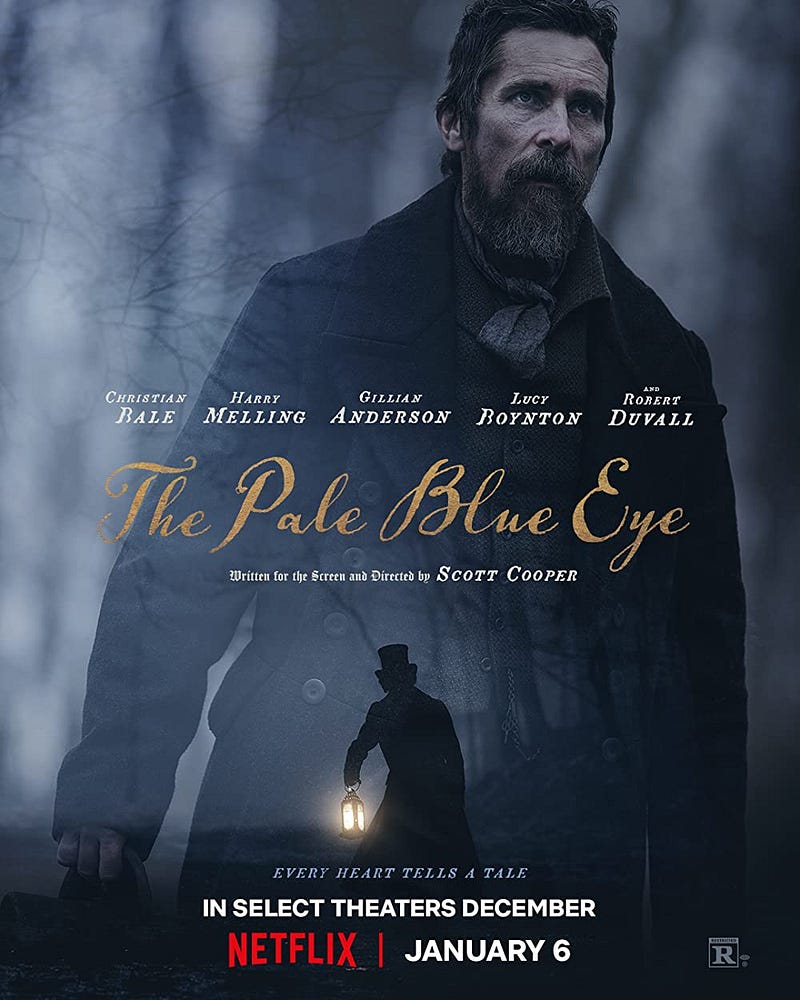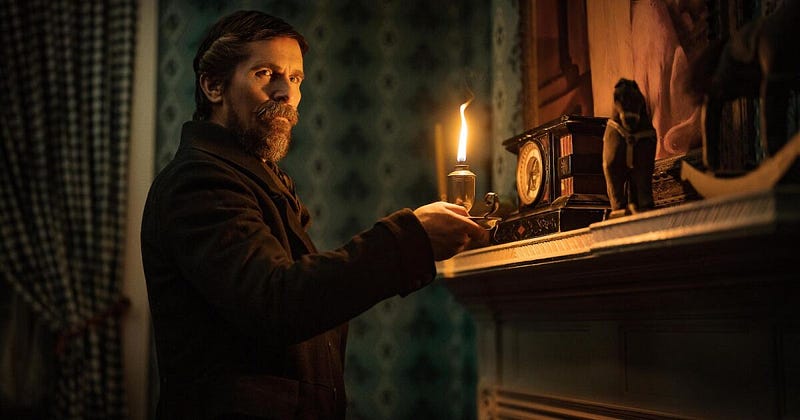“The man you are looking for is a poet”.

“The boundaries which divide life and death are at best shadowy and vague. Who shall say where one ends, and the other begins?”
So begins my first new film of 2023, a gothic horror thriller whodunit (what a combination!) directed by Scott Cooper (Crazy Heart, Black Mass, Hostiles) in his sixth outing in the directors chair. Based upon the 2003 book of the same name written by Louis Bayard, the opening ten minutes lays before you the central narrative of the film wrapped in a brilliant ensemble cast in a New York of 1830 enveloped in a mid-winter deep in snow that I immediately drew comparisons with the cold, bleakness of Quentin Tarantino’s The Hateful Eight, the gothic darkness of Tim Burton’s Sleepy Hollow and with a central character in the guise of Edgar Allan Poe, I was also immediately drawn to the James McTeigue directed The Raven from 2012.
The problem is The Pale Blue Eyes has a number of exceedingly good parts but a rather disappointing whole.
Attempting to piece together the macabre puzzle of a hanged man and a ritual death is an ensemble cast ostensibly led by Timothy Spall as “Superintendent Thayer” (although he’s seemingly always called “Colonel”) of the West Point Military Academy, a stiff backed authoritarian ably assisted by the wonderful Simon McBurney as his loyal rabble-rouser “Captain Hitchcock”. Toby Jones is almost immediately introduced as “Dr Daniel Marquis” a medical practitioner tasked with the autopsy of a dead body with a missing heart and much later we are bestowed the pleasure of a brilliantly bizarre performance from Gillian Anderson as his eccentric wife “Mrs Julia Marquis”. Harry Lawtey (Artemus Marquis) and Lucy Boynton (Lea Marquis) fulfil the Marquis family as well as providing cameo support alongside the beautiful Charlotte Gainsbourg as “Patsy” and the magnificent Robert Duvall as “Jean-Pepe” “a peculiar man” who’s “filled with senseless fantasies”, as can also be argued with the real star of this particular show, Harry Melling as “Edgar Allan Poe”. Melling imbues Poe exactly as you’d imagine, a scatterbrain artist and poet on the edge of fantasy and madness, romance and melancholic despair, and Melling is fantastic in support of the Ichabod Crane of our gothic tale if you will, and whom are thrust together as well as being “both alone in this world”.

“Augustus Landor” (Christian Bale) Constantly reinforced as a “private citizen now”, Bale brings his retired detective persona brilliantly to life and always seemingly both in control as well as firmly in charge of the investigation. Despite being a mere citizen, Landor is deferentially treated as he’s tasked with saving the “honour of the United States Military Academy” from the grisly and macabre murders that have taken the lives of a growing number of their cadets. A reformed alcoholic perhaps, Landor is very definitely a heart broken and reclusive widower who also misses the light and love of a young daughter he calls affectionately calls “Mattie” and who “ran off” in increasingly mysterious circumstances. Quietly spoken, loquacious, thoughtful and with an intellect way ahead of its 1830 timeframe, Landor is also a rule breaker with very little to lose and Bale portrays his melancholic yet inquisitive air wonderfully.
“I didn’t want them to confess” states our murderer late in the piece, “I wanted them to die” and therein lies one of the film’s many themes alongside grief, despair, melancholy and the religion of light and dark, and the good versus evil that seeps through the film. The ritualistic removal of the dead men's hearts and the clues, letters and diary entries that lead to a “Magic Circle” alludes to Satanic death rituals, black-magic and the occult wrapped in a gothic horror whodunit that via the cinematography skills of Masanobu Takayanagi, the musical soundtrack of Howard Shore and particularly the production design of Stefania Cella and the costume design of Kasia Walicka Maimone, together with the wealth of set designers and production managers, is magnificently brought to life.
The film looks beautiful and I love two of director Scott Cooper’s previous films, but there’s something missing here and I can’t put my ink stained finger on it.
Even a surprising twist couldn’t save it in my affections.
Thanks for reading. Just for larks as always, and always a human reaction rather than spoilers galore. My three most recently published film articles are linked below or there’s now well over 200 blog articles (with 400+ individual film reviews) within my archives from which to choose:
“Man on Fire” (2004)
The Best of Tony Scott — Vol 2.medium.com
“A Single Man” (2009)
Tom Ford’s beautiful cinematic debut.medium.com



